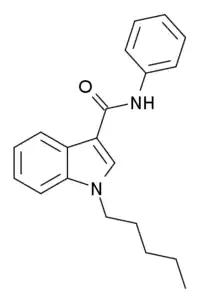SDB-005
SDB-005 is an indazole-based synthetic cannabinoid that has been sold online as a designer drug.[1] It is presumed to be an agonist of the CB1 and CB2 cannabinoid receptors. SDB-005 is the indazole core analog of PB-22 where the 8-hydroxyquinoline has also been replaced with a naphthalene group.
 | |
| Legal status | |
|---|---|
| Legal status |
|
| Identifiers | |
| |
| CAS Number | |
| PubChem CID | |
| ChemSpider | |
| UNII | |
| Chemical and physical data | |
| Formula | C23H22N2O2 |
| Molar mass | 358.441 g·mol−1 |
| 3D model (JSmol) | |
| |
| |
The code number SDB-005 was originally used for a different compound, the N-phenyl instead of N-benzyl analogue of SDB-006. This compound is a potent agonist of the CB1 receptor (Ki = 21 nM) and CB2 receptor (Ki = 140 nM).[2]

However, SDB-005 was subsequently used as the name for the indazole-3-carboxylate compound mentioned above when it was sold in Europe as a designer drug, and was entered into the EMCDDA synthetic drug database under this name.[3] Consequently, there are now two distinct, yet fairly closely related cannabinoid compounds, which may both be referred to under the code SDB-005.
References
- "SDB-005". Cayman Chemical. Retrieved 27 June 2015.
- Banister SD, Wilkinson SM, Longworth M, Stuart J, Apetz N, English K, et al. (July 2013). "The synthesis and pharmacological evaluation of adamantane-derived indoles: cannabimimetic drugs of abuse". ACS Chemical Neuroscience. 4 (7): 1081–92. doi:10.1021/cn400035r. PMC 3715837. PMID 23551277.
- EWS_EU: Neue Psychoaktive Substanzen, April 2015